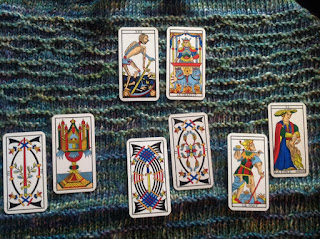How many
times have you laid cards for a client, only to find that they are speaking just
about the situation the person is currently undergoing? This restatement of what is happening is
confirmatory, but it also doesn’t advance help to the client, who is already
well acquainted with her situation. Sometimes the client is so full of their
predicament that the cards merely echo the distress, which was what we got this
week, when a woman came to ask about her slow slide into addictive behaviour
and any possible action she could take. I laid a short sequence with a line of three
cards and selecting the bottom card of the pack as the key card that unlocks
it.
 |
| Death, 3 and 10 Swords, Fool. Tarot de Marseilles, Camoin. |
The line of
3 Swords, 10 Swords, Fool had Death as
the key card. These cards confirmed that
due to growing unhappiness, things were escalating into compulsive behaviour,
and that she was beginning to act like a person who just doesn’t care anymore.
The client is also a tarot student, and it didn’t take her long to read along
with me, that Death was saying ‘stop with this behaviour already!’ And, yes, from a visual perspective we could
see that the Fool and Death both have their own implement – the sturdy walking
stick of the Fool and the scythe of Death: a choice of tramping further along
the same road, or stopping this particular journey right now.
She said
that the addictive behaviour wasn’t particularly gross, but that days were
going by wherein she was just eating, watching tv and not attending to things:
it was all going slide so easily and without her noticing. Someone had phoned
up about work she should have finished, and she could work up no enthusiasm or
even fear about handing in late, so she had a wake-up call. She’s had a severe
loss in the last year and is still in bereavement, so it’s unsurprising that
she’s finding things hard. A loss opens a space in you always, but nature
abhors a vacuum, and so other things come to fill you up, like the bacteria
that come to live in the space at the top of the milk bottle if you pour out
some of the milk. Addictive behaviour tries
to substitute the loss. This we know, but it doesn’t help the client move on.
So what can she do?
Seeking
some better resolution and help for her, I laid one card next to each of the
original set. The cards that leapt out
of the pack were so apposite, we both quietened down and looked at them. In the case of the two trumps that were
facing left, they were countered by cards of such staggering brilliance and
dynamism, we couldn’t help but gasp, because these were the unseen answers to
what the original cards were looking at.
 |
| Additional cards: Chariot, Ace Cups, 2 Swords, Strength. Tarot de Marseilles, Camoin |
3 Swords + Ace Cups: The grief and unhappiness are the
causation of this problem: she needs the comfort of her home and its consolations,
as well as love and affection of family and friends. This is something she said
she has been avoiding.
10 Swords + 2 Swords: she can de-escalate the compulsive
behaviour through separating herself from the opportunities. Since every habit formed takes a number of
steps to be established, her best route back to herself is to reduce her
dependency on the things that she is currently seeking out, cutting them down before
cutting them out, as Death has suggested.
Fool + Strength: when you are on a headlong slide, you need
discipline to stop you. Finding an addiction support group will help her find
the strength to implement this last step: dealing with the cat ahead of her,
rather than being chased headlong by the cat behind.
Death + Chariot: If Death is ‘stop,’ then Chariot is definitely
‘go.’ My client said that, for her, this was a combination that reminded her of
‘getting back on the horse after it’s thrown you. It feels as if I’ve been held
in some kind of tape loop, repeating things over and over, but now I can get a
hold on things.’
Of course,
both Strength and the Chariot are about taking control over our passions and
habits, driving the chariot with both horses so that you steer straight again.
I know my student: she is a determined person who is normally self-supporting.
She may need help now, but she went away with a fresh resolve which was
heartening.
When we have
a card that won’t read, or that we can’t understand or need to know more about,
it is common enough to lay one amplifying card next to it, so that our understanding
can catch up. I also do this frequently where reading older tarots, where the
figures on the trumps and courts face in either direction: I draw a card to see
what they are looking at, but I had never lain so many amplifying cards before.
If your client is in a distressing one-note situation where it seems like the
film Ground Hog Day, it’s maybe time
to turn up the volume and amplify the story so that you can offer better
insight and help.
Caitlín Matthews is currently at work on Untold Tarot: The Lost Art of Reading Ancient Tarots. Her published books can be found at www.hallowquest.org.uk